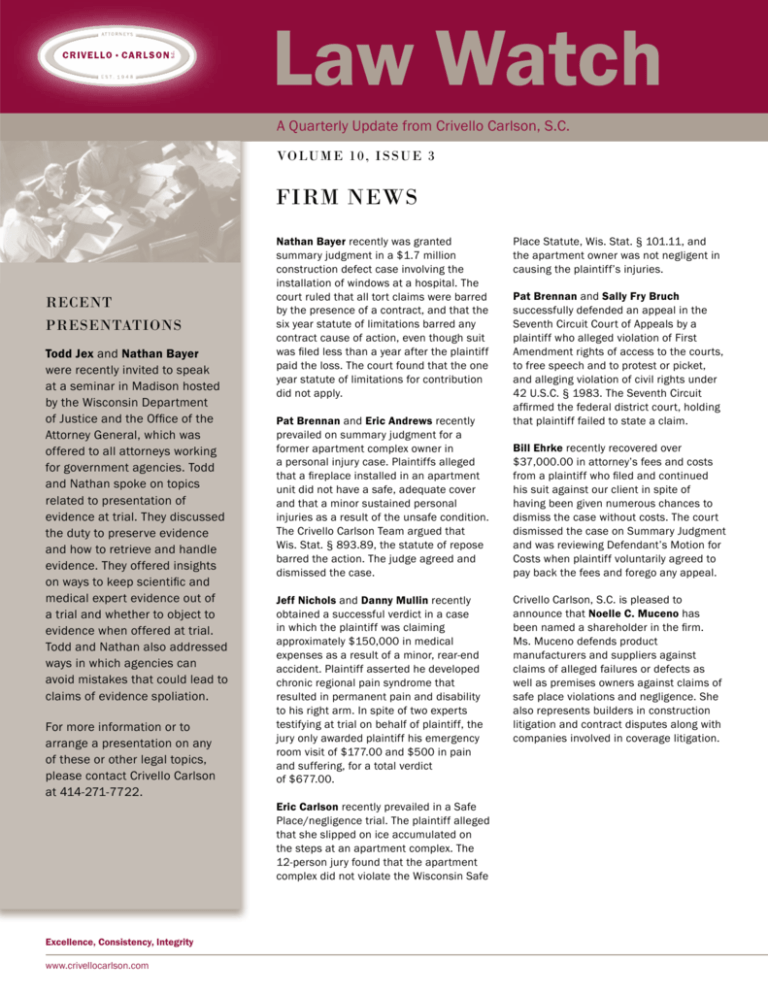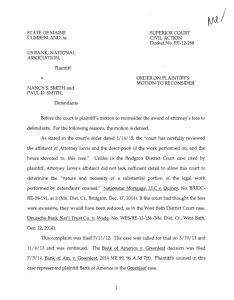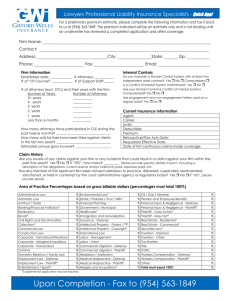Law Watch - Crivello Carlson, SC
advertisement

Law Watch A Quarterly Update from Crivello Carlson, S.C. VOLU ME 1 0 , I S S UE 3 FIRM NEWS RECENT PRESENTATIONS Todd Jex and Nathan Bayer were recently invited to speak at a seminar in Madison hosted by the Wisconsin Department of Justice and the Office of the Attorney General, which was offered to all attorneys working for government agencies. Todd and Nathan spoke on topics related to presentation of evidence at trial. They discussed the duty to preserve evidence and how to retrieve and handle evidence. They offered insights on ways to keep scientific and medical expert evidence out of a trial and whether to object to evidence when offered at trial. Todd and Nathan also addressed ways in which agencies can avoid mistakes that could lead to claims of evidence spoliation. For more information or to arrange a presentation on any of these or other legal topics, please contact Crivello Carlson at 414-271-7722. Excellence, Consistency, Integrity www.crivellocarlson.com Nathan Bayer recently was granted summary judgment in a $1.7 million construction defect case involving the installation of windows at a hospital. The court ruled that all tort claims were barred by the presence of a contract, and that the six year statute of limitations barred any contract cause of action, even though suit was filed less than a year after the plaintiff paid the loss. The court found that the one year statute of limitations for contribution did not apply. Pat Brennan and Eric Andrews recently prevailed on summary judgment for a former apartment complex owner in a personal injury case. Plaintiffs alleged that a fireplace installed in an apartment unit did not have a safe, adequate cover and that a minor sustained personal injuries as a result of the unsafe condition. The Crivello Carlson Team argued that Wis. Stat. § 893.89, the statute of repose barred the action. The judge agreed and dismissed the case. Jeff Nichols and Danny Mullin recently obtained a successful verdict in a case in which the plaintiff was claiming approximately $150,000 in medical expenses as a result of a minor, rear-end accident. Plaintiff asserted he developed chronic regional pain syndrome that resulted in permanent pain and disability to his right arm. In spite of two experts testifying at trial on behalf of plaintiff, the jury only awarded plaintiff his emergency room visit of $177.00 and $500 in pain and suffering, for a total verdict of $677.00. Eric Carlson recently prevailed in a Safe Place/negligence trial. The plaintiff alleged that she slipped on ice accumulated on the steps at an apartment complex. The 12-person jury found that the apartment complex did not violate the Wisconsin Safe Place Statute, Wis. Stat. § 101.11, and the apartment owner was not negligent in causing the plaintiff’s injuries. Pat Brennan and Sally Fry Bruch successfully defended an appeal in the Seventh Circuit Court of Appeals by a plaintiff who alleged violation of First Amendment rights of access to the courts, to free speech and to protest or picket, and alleging violation of civil rights under 42 U.S.C. § 1983. The Seventh Circuit affirmed the federal district court, holding that plaintiff failed to state a claim. Bill Ehrke recently recovered over $37,000.00 in attorney’s fees and costs from a plaintiff who filed and continued his suit against our client in spite of having been given numerous chances to dismiss the case without costs. The court dismissed the case on Summary Judgment and was reviewing Defendant’s Motion for Costs when plaintiff voluntarily agreed to pay back the fees and forego any appeal. Crivello Carlson, S.C. is pleased to announce that Noelle C. Muceno has been named a shareholder in the firm. Ms. Muceno defends product manufacturers and suppliers against claims of alleged failures or defects as well as premises owners against claims of safe place violations and negligence. She also represents builders in construction litigation and contract disputes along with companies involved in coverage litigation. Update RECENT WISCONSIN SUPREME COURT DECISIONS SAFE PLACE LITIGATION - Jury Instructions and Constructive Notice Kochanski v. Speedway SuperAmerica 2014 WI 72 Kochanski slipped and fell on snow as he walked into a Speedway SuperAmerica convenience store. At trial, the plaintiff requested and was given the absent witness instruction because Speedway relied only on surveillance video and did not call any former employees as witnesses. Kochanski’s attorney used the instruction to argue that Speedway didn’t call any witnesses because the testimony would have been unfavorable, and the jury returned a verdict in favor of Kochanski. The court of appeals reversed and the supreme court affirmed the reversal, holding that the jury instruction was improper and prejudicial. The court said there was no indication in the record that any current Speedway employees could provide information about the store’s snow removal methods, and the plaintiff did not establish that Speedway had any control over its former employees. Furthermore, Speedway provided the employees’ names and addresses to Plaintiff, but Plaintiff made no showing that he could not compel their appearance at trial by subpoena. The instruction was prejudicial, because plaintiff relied on the inference of the witness instruction to satisfy a necessary element of proof of his claim: constructive notice of an unsafe condition. Because the plaintiff offered no evidence of how long the alleged unsafe condition existed, the jurors were misled by the instruction and erroneously believed that the element had been fulfilled. Excellence, Consistency, Integrity www.crivellocarlson.com INSURANCE LAW - MUNICIPAL LAW - Indemnification Immunity Blasing v. Zurich American Insurance Company Legue v. City of Racine 2014 WI 73 The plaintiff was injured by an employee of Menards while the employee was loading the plaintiff’s truck with lumber. The plaintiff had automobile insurance through American Family Mutual Insurance Company. Menards argued that its employee was covered as a permissive vehicle user under the plaintiff’s insurance policy. American Family argued that it was not required to defend Menards or provide coverage, even if it was determined that the Menards employee negligently injured the plaintiff. The court of appeals concluded that coverage under the plaintiff’s policy was required by the omnibus statute, Wis. Stat. § 632.32. The supreme court affirmed, though it did not reach the question of whether the omnibus statute required such an outcome. Instead, it held that the policy provided coverage and that the result of requiring coverage was not absurd. The court likened the situation to a motor vehicle lawsuit where the named insured is injured by a third party who is also insured by the same company. The named insured would face an attorney supplied by her own insurance company, and “both the injured named insured and the tortfeasor are paying premiums that support the defense of the tortfeasor against the injured named insured.” The court also explained that in the context of this claim, the plaintiff should be considered a thirdparty victim of a tort rather than a named insured. Further, the result would not grant broader coverage to the permissive user than to the named insured, because the court reasoned that all insureds are treated alike under the policy. Finally, it was irrelevant that Menards may have had insurance coverage for its employee. 2014 WI 92 The plaintiff filed suit against the City of Racine after she was hit by a Racine police car that was responding to an emergency dispatch call. The traffic code privileges emergency responders to violate rules of the road during emergencies. Wis. Stat. § 346.03. Section 346.03 further provides that the emergency responders’ privilege to violate rules of the road “do[es] not relieve [responders] from the duty to drive … with due regard under the circumstances for the safety of all persons nor … protect [responders] from the consequences of … reckless disregard for the safety of others.” Sec. 346.03(5). The supreme court held that the “due regard” requirement imposes liability on governmental actors in certain circumstances, and that “due regard” and related police department policies and procedures creates a ministerial duty. Under the facts of the case, the police officer violated his duty to operate the vehicle with due regard and therefore was not entitled to immunity. WRONGFUL DEATH - Persons Entitled to Recover Hailey Marie-Joe Force v. American Family Mut. Ins. Co. 2014 WI 82 The plaintiffs were the minor children of the deceased who were attempting to recover for the wrongful death of their father under Wis. Stat. § 895.04(2). The children’s mother was estranged from their father at the time of his death and did not have a claim under the wrongful death statute. (This portion of the circuit court’s ruling was not appealed.) The defendants argued that the mother’s children were likewise barred from recovery. Full Service Litigation Attorneys Trial, Appellate, Mediation and Arbitration The Waukesha County Circuit Court agreed with the defendants, but the supreme court reversed: “we interpret the phrase ‘surviving spouse’ in the present case as not including Linda Force, the deceased’s estranged spouse who, as a result of the circuit court’s dismissal of her wrongful death claim (which was not appealed), is barred from recovery under Wis. Stat. §§ 895.03 and 895.04(2). If Linda Force is not a ‘surviving spouse’ under the statute, the parties do not dispute that the minor children have a cognizable claim as lineal heirs. As lineal heirs of the deceased, the children would be first in line for any recovery for the wrongful death of their father.” HARASSMENT INJUNCTIONS - Legitimate Purpose Board of Regents – UW System v. Jeffrey S. Decker 2014 WI 68 The Dane County Circuit Court issued a harassment injunction against the defendant under Wis. Stat. § 813.125 after the defendant, a former student at UW-Stevens Point, threatened to interfere with university functions if his demands regarding segregated fees were not met. He also tried to steal papers from the Chancellor during a meeting and, after being suspended, continued to appear on campuses despite being banned. He repeatedly told university employees that he had no intention of abiding by the terms of the suspension. The court of appeals reversed the circuit court, holding that the defendant had a legitimate purpose for his actions: protesting university fees. The supreme court reversed the court of appeals and held that the circuit court properly exercised its discretion in granting the harassment injunction and sufficient evidence existed for the court to find that the defendant’s conduct lacked a legitimate purpose. Stay connected. Stay connected with Crivello Carlson and Wisconsin legal news through our firm blog, cclegalupdate.com and by following us on Facebook and Twitter! MOTIONS TO DISMISS - Business Judgment Rule Data Key Partners v. Permira Advisors LLC 2014 WI 86 Plaintiffs claimed that the defendant violated its fiduciary duties to both minority and majority shareholders by selling a business to the defendant. The defendants responded that the plaintiffs’ claims must be dismissed because they did not plead sufficient facts to plead around the business judgment rule found in Wis. Stat. § 180.0828. The circuit court agreed and dismissed the action, but the court of appeals reversed. The supreme court reversed the court of appeals and held that the business judgment rule set forth unequivocal terms on which directors may be held liable for their decisions. A “straightforward application of notice pleading standards” showed that the plaintiffs’ Second Amended Complaint did “not plead facts sufficient to plausibly show that the directors’ actions come within the terms of potential liability.” The pleadings, though not devoid of facts, did not show that the directors’ actions were not the product of business judgment. RECENT DECISIONS FROM THE SEVENTH CIRCUIT COURT OF APPEALS PRODUCTS LIABILITY - Risk Contribution Theory Gibson v. American Cyanide, et al. No. 10-3814 Plaintiff sued former manufacturers of paint containing white lead carbonate pigments, an ingredient that was ultimately banned in the 1970s. Plaintiff alleged that he was poisoned by the white lead carbonate pigment in the paint in his home. However, he could not identify what specific manufacturer produced the paint to which he was exposed. Thus, his case relied on the risk-contribution theory established by the Wisconsin Supreme Court in Thomas v. Mallet, 2005 WI 129. The risk-contribution theory allowed plaintiff to proceed with his claim without having to identify the specific entity or entities that produced or sold the product producing the harm. In 2010, the district court in Gibson granted the defendants’ motion for summary judgment, holding that the risk-contribution theory of Thomas v. Mallet violated substantive due process. However, the Seventh Circuit Court of Appeals reversed, concluding that the Constitution grants broad deference to states to develop their common law, and the risk-contribution theory is not arbitrary or irrational, and therefore comports with due process. The Seventh Circuit also stated that retroactive application of Wis. Stat. § 895.046 (abolishing the riskcontribution theory) violated due process. Get Law Watch Via Email. To receive electronic versions of Law Watch, sign up through our online resource center at crivellocarlson.com PRESORTED FIRST-CLASS MAIL U.S. POSTAGE PAID MILWAUKEE, WI PERMIT NO. 3707 710 North Plankinton Avenue Suite 500 Milwaukee, WI 53203 Upcoming Decisions PLAINTIFF’S ATTORNEY CANNOT VETO CLIENT’S SETTLEMENT OF LEMON LAW CLAIMS Larry Drabot and Sara Mills recently prevailed in the Wisconsin Supreme Court in a dispute over attorney fees. See Betz v. Diamond Jim’s Auto Sales, 2014 WI 66. Betz hired a well-known Lemon Law attorney to represent him, and sued Diamond Jim’s under the WI deceptive trade practices statute. However, during the pendency of the litigation, and unbeknownst to counsel for either party, Betz and the owner of Diamond Jim’s met and hammered out their own settlement agreement. When Betz’s attorney found out about the settlement, he filed a motion seeking to recover statutory attorney fees from Diamond Jim’s– despite the fact that Diamond Jim’s thought it had settled the matter in its entirety. Larry and Sara argued that the settlement agreement encompassed the entirety of the claims, including Betz’s claim for attorney fees. Because the right to recover statutory attorney fees belongs to the client and not to the attorney, Betz settled that claim and precluded any further attempt to recover those fees from Diamond Jim’s. In reversing the court of appeals and holding in favor of our client, the WI Supreme Court agreed with our arguments and held that the settlement agreement entered into between Diamond Jim’s and Betz is clear, unambiguous, and enforceable. It also held that the retainer agreement between Betz and his attorney did not assign his statutory right to recover attorney fees to his lawyer; therefore Betz’s attorney could not look to Diamond Jim’s to recover his fees. CONTACT US If you would like: • Additional information • Copies of decisions • To subscribe to Law Watch electronically Please contact us by calling (414) 271-7722. © 2014 CRIVELLO CARLSON, S.C. Excellence, Consistency, Integrity www.crivellocarlson.com

![[2012] NZEmpC 75 Fuqiang Yu v Xin Li and Symbol Spreading Ltd](http://s3.studylib.net/store/data/008200032_1-14a831fd0b1654b1f76517c466dafbe5-300x300.png)





